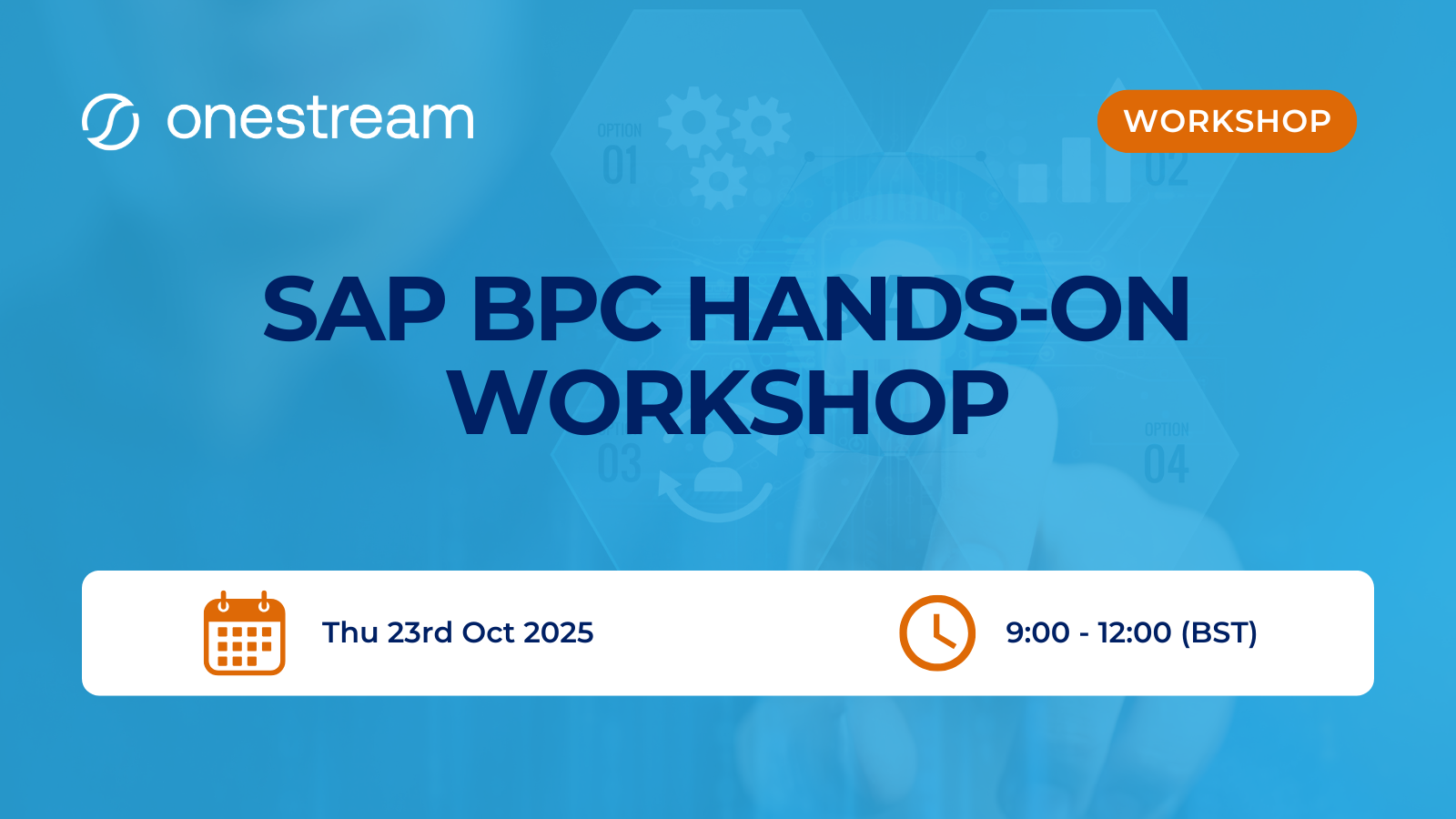
SAP BPC: Navigating the End of Maintenance and Exploring Alternative Solutions
As the modern finance technology landscape evolves, businesses are continually adapting to new technologies and platforms to maintain efficient and effective operations. This has never been more important for finance teams who are the interpreters of business information on behalf of the business.
SAP Business Planning and Consolidation (SAP BPC) was a leading solution in the enterprise performance management space, offering robust functionalities for financial planning, budgeting, forecasting, and consolidation. However, with the failure of SAP to invest for many years and now, the looming end of maintenance for SAP BPC, organisations must look ahead to alternative solutions that can support their evolving needs.
Understanding the end of maintenance timeline for SAP BPC
SAP has provided clear timelines for the end of maintenance for the various versions of SAP BPC. Most pressingly, the Microsoft version of BPC, which has been in maintenance mode with no enhancements for well over 10 years, is due to reach end of life in June 2026. The remaining users of this version have been poorly served by SAP for many years and are hampered by a solution that is at least two generations of technology out of date.
The maintenance for SAP BPC v 10.1 for SAP BW (NetWeaver version) will continue until the end of 2027.
Similarly, the latest SAP BPC release supporting the SAP BW/4HANA product line will align with the SAP S/4HANA maintenance extension and will be maintained until at least 2040. It is noted though, that not only has this variant of the BPC solution failed to benefit from any direct enhancements for many years, in the upcoming releases (version 2025) there is actually a deprecation of functionality.
*For the most recent dates - please check our summary blog: https://concentricsolutions.com/blog-article/summary-end-of-maintenance-dates-for-sap-bpc
Depending on the version deployed, businesses will be forced to plan their transition to new solutions, potentially very soon, if they want continuity and stability in their financial processes. However, even those on the latest releases of BPC should consider the cost of ownership and the build-up of technical deficit in their business from SAP’s long term dis-investment in this solution set.
Businesses are therefore acting to protect themselves with, as a minimum, a diligence exercise on the viability and suitability of their existing SAP BPC deployments and the risks they pose to their organisation.
The options for any course of action are influenced by the business need, current and future requirements, business culture, budget availability and many other factors.
Can BPC still be right for me?
The answer to this is possibly, although, increasingly, not likely.
Replacing SAP BPC with an alternative solution, regardless of what that solution is, has a capital project impact – this takes resources both internally and externally, so it may not be possible to do anything in the short term. BPC may also fully meet current business needs for the scope it is deployed to address – while BPC is an EPM solution, there are many instances in which it is deployed as a point solution (for instance just for statutory consolidation) and it may remain fit for purpose within that scope.
However, there are challenges that may not be apparent at first sight:
- End of maintenance means there will be no more platform or security patches resulting in greater challenges in ‘keeping the lights on’;
- With out-of-maintenance software, there are corporate policy matters to address as well as risks of audit qualification;
- Increasing costs of maintaining legacy platforms that cause practical challenges for IT with the additional costs and complexity of managing archaic infrastructure;
- Reducing market capability to provide support and consulting services in this technology that is already driving up costs, and seeing users suffer with longer outages and challenges in completing essential solution maintenance.
This is all not to mention the operational management gap that continues to build with competitors who embrace more advanced, flexible and lower overhead modern capabilities.
What about other SAP options?
SAP has several options available to users – from SAP Analytics Cloud (SAC) which may already be deployed by some to supplement BPC, to SAP S/4HANA Group Reporting, the SAP S/4HANA embedded ERP based consolidation module.
These have their merits and should certainly be a consideration for anyone with a significant SAP ERP landscape, although weaknesses appear where a multi-tier ERP approach has been adopted and any instances of ERP other than S/4HANA can result in a significant practical challenge to deployment and integration.
Alternatives to SAP
Many businesses will want to or should consider non-SAP best-of-breed alternatives to BPC. This may be driven by many factors: a simple due diligence in selecting any business technology; a desire for specific business functionality; a need to manage reporting in a heterogeneous or even just non-SAP ERP landscape; or, for many, a desire to move away from SAP as a supplier which is often seen in observed rates of dissatisfaction amongst their users.
A run-down of the alternatives are:
1. OneStream
OneStream offers a unified platform for corporate performance management (CPM), providing end-to-end management of enterprise-wide consolidation, close, and financial & operational planning and forecasting.
2. Anaplan
Anaplan is a cloud-based business planning and performance management platform that enables companies to plan and model, make decisions, and collaborate across the enterprise, with their recent Fluence acquisition, they have added a Consolidation capability to their portfolio.
3. Oracle Fusion EPM
Oracle provides a cloud platform for bringing together EPM capabilities including planning, forecasting, consolidation and financial analytics for Oracle users alongside their support for a heterogeneous ERP landscape.
4. IBM Planning Analytics
IBM Planning Analytics is a mature planning solution that helps businesses automate planning, budgeting, forecasting, and analysis processes and sits alongside the Controller consolidation application.
5. CCH Tagetik
CCH Tagetik is a mature solution that delivers capabilities, including budgeting, forecasting, consolidation, and business intelligence and is currently transitioning from on-premises to cloud deployment.
6. Lucanet
Lucanet is a specialist in financial close and consolidation solution providing strong process support and powerful financial analytics in a structured configurable environment.
There are of course many solutions available today and understanding the scope of a solution and the business needs of the organisation will allow a focussing of the options that would be relevant.
Evaluating the right fit for your organisation
When thinking about alternatives to SAP BPC, it is important to assess the options based on many factors which include:
- Functional Fit: Does the alternative meet the specific financial planning, consolidation and other EPM needs of your organisation?
- Integration Capabilities: How well does the solution integrate with your source system
- User Experience: Is the solution user-friendly and does it offer an appropriate interface for finance and potentially non-finance professionals and business users?
- Scalability: Can the solution scale with your business growth and adapt to changing market conditions?
- Vendor Support: What level of support and maintenance does the vendor offer?
The end of maintenance for SAP BPC marks a significant shift for many organisations. However, it also presents an opportunity to embrace new solutions that can drive efficiency, innovation, and strategic value. By carefully evaluating alternatives and considering the specific needs of your business, you can ensure a smooth transition and continued and enhanced success in your financial planning and reporting processes.
If your organisation is still using SAP BPC for financial planning and consolidation, learn more about our EPM solutions and services.
Glossary
EPM – Enterprise Performance Management
CPM – Corporate Performance Management (same as EPM)
ERP – Enterprise Resource Planning which includes Financial Ledgers


